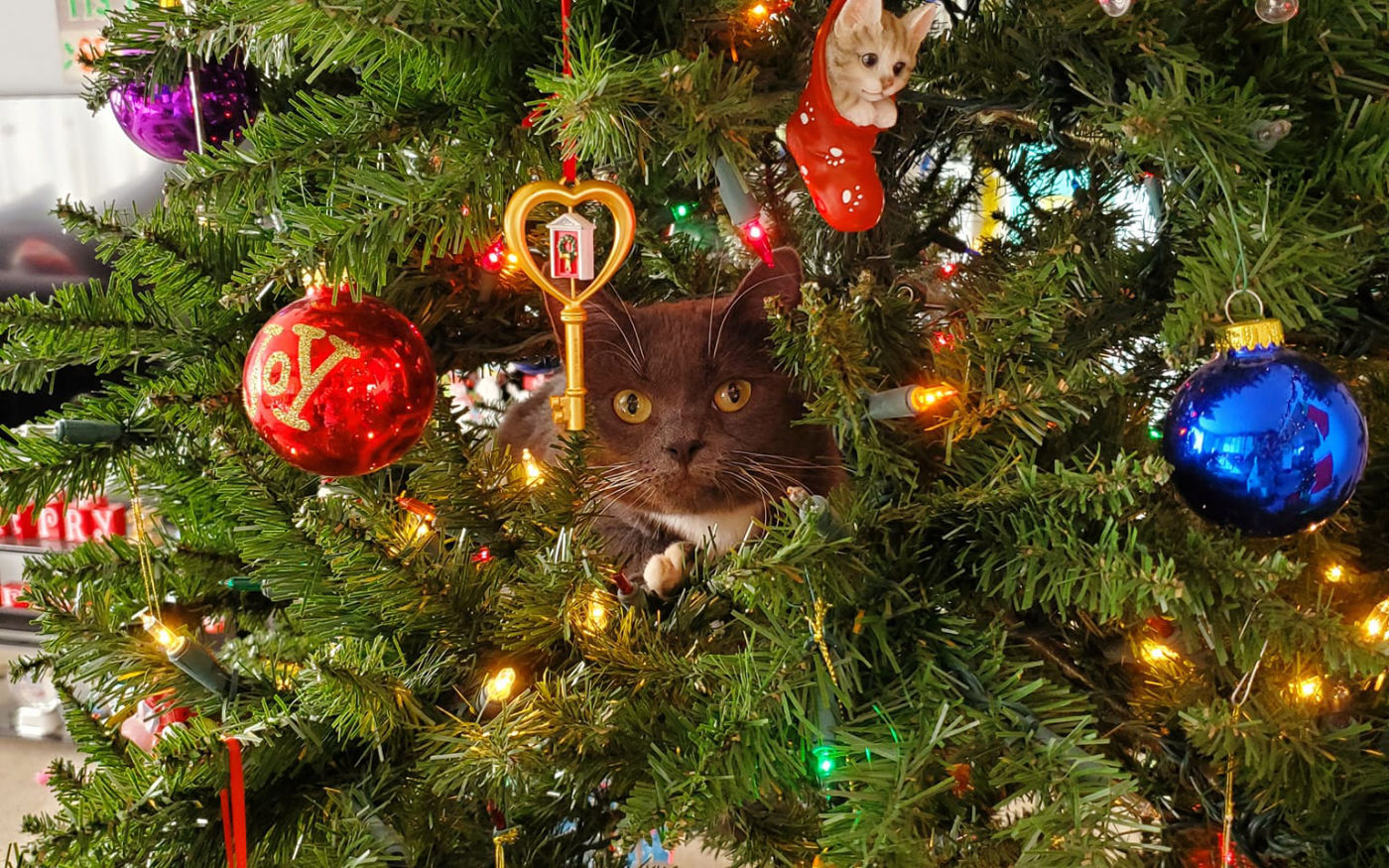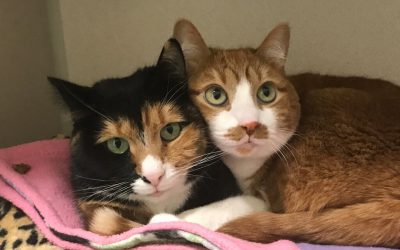Dear Ms. Kitty,
I have a scaredy cat who won’t let me trim her claws or take her to the vet. She used to be relaxed but that changed after she was accidentally locked in a room while a loud compressor was run. Will she ever get back to her old self?
Even a single trauma can alter a cat’s personality if it’s not addressed, creating a form of feline PTSD where he or she is seemingly scared of everything. Chronic stress can also come from other sources, like another cat who bullies or stray cats outside that intimidate.
Cats are very sensitive to their environment, including the emotions of their people. This can create serious health consequences and lower their quality of life.
Many of our upcoming holidays can be stressful for our cat friends. We can take steps to help them recover quickly and reduce the lasting effects of the trauma.

The Fear Free Pets Program identifies signs of Fear, Anxiety and Stress (FAS) in cats. These include hiding, going outside the box, over-grooming or major changes in behavior like being more defensive, needy or isolated.
Cats can become stressed by events that may seem insignificant to us. These can include:
- Vet appointments, groomer visits, car trips
- Strangers, changes in routine, holiday chaos and noise
- Moving, remodeling, rearranging furniture
- Vacations with pet sitter or boarding facility providing care
- New animals or people in the home, birth of a baby
- Storms, fireworks, loud neighbors
- Grooming, nail trims
- Administering medications
- Change in diet, injury or illness
- Strange animals outside the home
Cats remember the details of a FAS experience and will try to avoid going through it again. Many of these stressors can be minimized with desensitization training, calming support and positive associations.
Cats like consistency and predictability so when we make changes or take them out of their comfort zone we should try to go slow and give them something positive to offset their fight, flight or freeze response.
Resources for your Stress First Aid Kit
There are many products that can help your kitty deal better with stressful situations. Try some out ahead of time to know what products and methods work with your cat. Having them on hand will help address the situation quickly and reduce the lasting effects of a trauma.
- Smelling: familiar smelling bedding, catnip, cat pheromones like Feliway, calming collars like Nurture Calm
- Tasting: calming treats or supplements, Bach Flower Remedy (works for people too!), high valued food rewards, a diet without synthetic preservatives
- Hearing: calming music like classical, cat-specific music like Music for Cats, recorded heartbeat like in infant sound machines, white noise
- Touching: soothing blanket, massage, compression wrap like Thundershirt, vest harness, scratchers
- Seeing: cat DVDs like the Cat Sitter series, fish tank, bird feeders, limiting visual stress during transport with a carrier cover
- Environmental Support: hiding places, high perches, catios, puzzle feeders, play sessions
Comprehensive: anti-anxiety supplements or medication through your veterinarian
Cats in stress can get lost during the holidays. If I have a big family dinner planned but know my cats will be intimidated by unfamiliar people and activity, I plan ahead. I give them positive experiences like playtime and treats to make rearranging the furniture fun.
When people come, I put them in their safe room with calming music, toys and treats. If friends or family want to visit, I introduce them quietly and not in a big group. I offer toys to make it fun for everyone. They are less stressed and so am I, knowing they won’t be so scared they may try to escape outside.
For my cats’ fear of the vet, I first take them to a cat friendly vet who practices Fear Free handling to avoid unnecessary stress in the first place.
I give them calming treats or supplements 24 hours in advance. Their carrier has been left out so it’s familiar and I treat it with Feliway pheromones and cover with a cloth. I withhold food a few hours ahead to minimize any motion sickness and to make treats a positive distraction during the exam.
I play relaxing sounds on the trip, like classical music or Music for Cats. I ask the vet to examine them in the safety of their carrier, if possible.
Fights can break out when a cat comes home smelling and acting like a stranger. When we return home, I place the cat in a separate room to settle first. I rub them all with familiar bedding so everyone smells normal again. I reintroduce the cats slowly and keep them separate until the returned cat has adjusted.
Nipping your cats’ stress in the bud can go a long way toward making vet visits, the holidays and other big changes more pleasant for everyone…including your cats!
Melissa Shandley is one of the founders of Happy Cats Haven, a Cat Behavior Consultant and Cat Care Provider.
Play and Treat Pet Service
shandleym@q.com
719-686-8778




